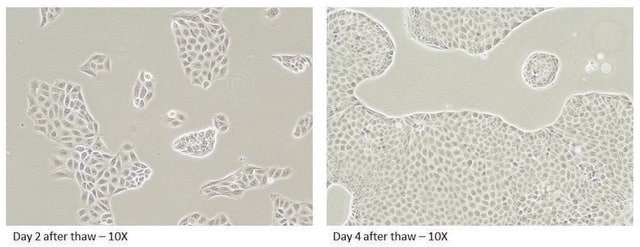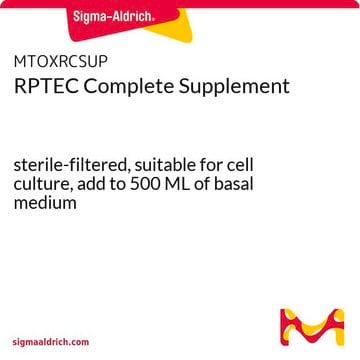MTOX1071
Kidney PTEC MDR1 KnockoutCells [MDR1 knock out (-/-)]
Human female kidney, proximal convoluted tubule epithelial cells
About This Item
Recommended Products
product name
Kidney PTEC MDR1 KnockoutCells [MDR1 knock out (-/-)],
biological source
human female renal (proximal convoluted tubule epithelial cells)
form
liquid
OMIM accession no.
storage temp.
−196°C
Gene Information
human ... ABCB1(5243)
General description
Application
RPTEC SA7K control cells can also be used to measure compound uptake/efflux by transporters using inhibitors. Precision editing in RPTEC SA7K transporter KO cells provides a more predictive platform for compound uptake/efflux by transporters without the need for non-specific inhibitors.
RPTEC SA7K cells have been validated for use on the Mimetas 3-lane OrganoPlate® in both toxicity and barrier integrity assays (( Z742750).
RPTEC SA7K cells can also be used on the AIM Biotech 3D cell culture chip in toxicity and permeability assays ( DAX01).
Features and Benefits
- Sigma′s human RPTEC MDR1 (P-gp) Knockout (KO) allows investigations of drug transporter interactions involving P-gp in the kidney.
Quality
Other Notes
Legal Information
Disclaimer
Storage Class Code
10 - Combustible liquids
WGK
WGK 3
Flash Point(F)
Not applicable
Flash Point(C)
Not applicable
Certificates of Analysis (COA)
Search for Certificates of Analysis (COA) by entering the products Lot/Batch Number. Lot and Batch Numbers can be found on a product’s label following the words ‘Lot’ or ‘Batch’.
Already Own This Product?
Find documentation for the products that you have recently purchased in the Document Library.
Articles
AIM Biotech's modular platform enables simple to complex 3D cell culture for various research needs.
AIM Biotech's modular platform enables simple to complex 3D cell culture for various research needs.
AIM Biotech's modular platform enables simple to complex 3D cell culture for various research needs.
AIM Biotech's modular platform enables simple to complex 3D cell culture for various research needs.
Our team of scientists has experience in all areas of research including Life Science, Material Science, Chemical Synthesis, Chromatography, Analytical and many others.
Contact Technical Service







